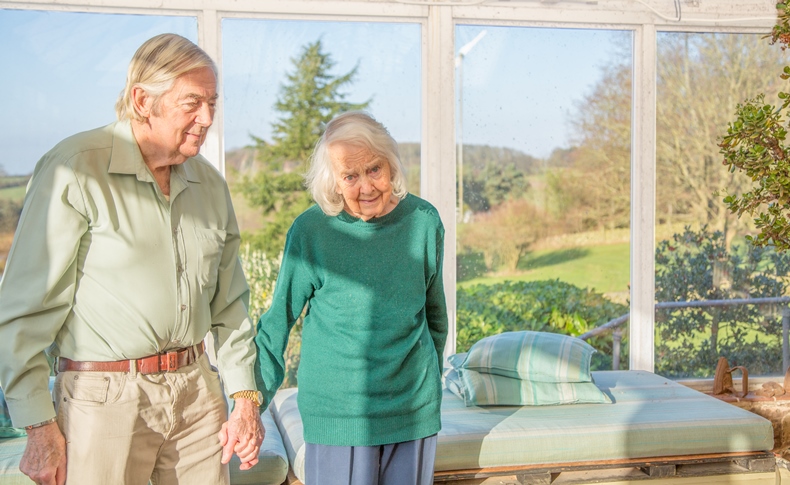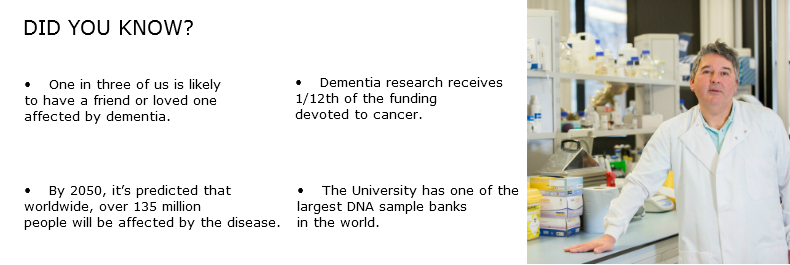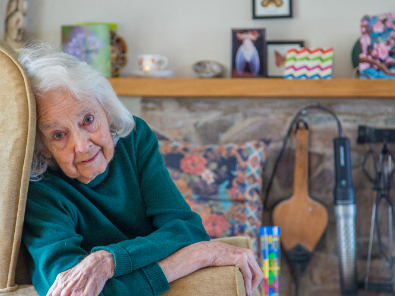Join us in the fight against dementia

Your support is helping our Nobel Prize-winning MRI researchers become the first in the world to use cutting-edge technology to tackle dementia. However this isn’t the only ground-breaking research underway here at the University.
Nottingham researchers discovered 21 of the 22 known dementia genes
Genetics are one of the leading factors determining a person’s chance of developing Alzheimer’s disease – the most common cause of dementia. With current treatments focused on managing the symptoms, there is an urgent need to understand how and why the disease develops in the first place. It’s why uncovering the genetic relationships is a key focus for Professor Kevin Morgan, a world-renowned dementia geneticist.
Professor Morgan manages one of the largest DNA sample collections in the world and was instrumental in using it to identify 21 of the 22 risk genes linked to Alzheimer’s. Understanding the genes which are linked to a low risk of developing dementia are important for guiding new drug development as they could provide vital clues on how to combat or slow the disease.
“We know that Alzheimer’s is caused by a mixture of genetic and environmental factors. Discovering the genetic causes will help us better target our treatments and identify those most likely to be affected earlier, significantly improving the lives of those touched by this devastating disease.”
This is no easy task. Each of us has a DNA sequence containing three billion bases and any single change can possibly result in disease. If your DNA was printed on A4 sheets of paper, the stack of sheets would be 420 feet high!
Championing outstanding dementia care
Innovative research like this offers hope for the future but what about the reality for those living with dementia today? On our Jubilee Campus is the Centre for Dementia where researchers, NHS staff and academics are pioneering best practice in dementia care.
“There is no cure for dementia today but what we can have right now is fantastic care. Understanding what this looks like and how to deliver it is crucial” says Professor Martin Orrell, Director of the Institute of Mental Health. “It’s why we’re pioneering a range of exciting projects such as studying how communication problems can affect care, and how visual arts can enhance the wellbeing of those with dementia”.

Living with dementia - for the love of Angela
|
Pictured: Angela Marmont

|
Angela and Tony Marmont have been together for 64 years but today they’ve never seemed further apart. Angela, a former Nottingham school teacher, now needs round-the-clock care after showing signs six years ago that something was wrong with her memory.
"She would pop out in the car in Loughborough and find herself hours later at a service station north of Nottingham asking for directions,” said Tony.
Now she can’t read, dress or use the bathroom alone, and we can’t communicate properly. I just have to live with the situation as it is. It’s dementia and it’s awful. But I still love being in her company and I can still feel the warmth between us.”
Dementia used to be a hidden disease in families. As a society we’ve invested in cancer research which is beginning to yield serious results. Now it’s time to do the same with dementia. It’s why I give to The University of Nottingham. I hope this research will help bring a brighter future for those that follow us.”
|
With your continued support, we can push dementia research forward
Thank you to everyone who has supported our research into dementia so far - including all those who supported last year's Life Cycle campaign - Life Cycle 5.
Sadly, funding for dementia research still lags far behind that available for other common conditions. Tony and Angela’s story is a heart-breaking reminder of why your help is needed now more than ever.
If you would like to support our research further, please visit www.nottingham.ac.uk/dementiares
Posted on Wednesday 16th March 2016